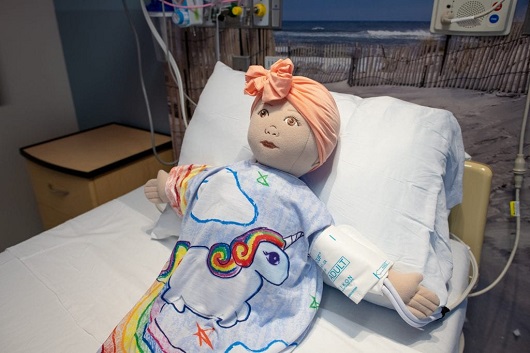5 Ways to Calm Your Child’s Nerves About Surgery

June 25, 2020
If your son or daughter needs surgery, it’s likely that you, as parents, are more anxious than your child. But children—no matter their age—are going to have some fears and worries of their own. Hospitals can be intimidating, but good preparation can help kids feel less anxious about surgery and get through the recovery period faster.
How can parents help children prepare for surgery and settle their nerves?
1. Explain the Surgery
First, explain what’s going to happen. Whether you use information from your doctor, order a book or find resources online, use whatever tools you can to explain to your child what will take place. Be honest: Trying to downplay the situation too much could lead to them mistrusting you in the future.
For younger children, you can use a stuffed animal to demonstrate how doctors will take their pulse and their temperature, and even where they will make an incision.
“Let your child ask as many questions as they need to,” says Victoriya Staab, M.D., a pediatric surgeon and medical director of pediatric trauma at K. Hovnanian Children’s Hospital at Jersey Shore University Medical Center. “The more you talk about the hospital experience, the less intimidating it will be when it’s time for surgery.”
2. Remember Your Body Language and Verbiage
While discussing the surgery and hospital stay, pay attention to your non-verbal cues, including your facial expressions, tone of voice and body language. Kids can pick up on your fear, even if your words are saying otherwise.
“Children may also have the misconception that they will wake up in the middle of surgery. It is important to educate your child that there is a doctor present the whole time to make sure this will not happen,” says Morgan Olsen, M.S., CCLS, a Certified Child Life Specialist at K. Hovnanian Children’s Hospital at Jersey Shore University Medical Center.
Also, focus on your word choice. Phrases and words like, “put you to sleep”, or “cut” might sound scary to some children. A child-friendly phrase that can be used in place of “put you to sleep” is “give your body medicine to sleep during surgery”.
Depending on the type of surgery your child is having they may have a smaller incision or a larger incision. When talking to them about the incisions they will have when they wake up with after surgery, the word “cut” can be replaced with, “a small or large opening made by the doctors to fix what is hurting or sick inside of your body while you are sleeping”.
3. View Preparation Materials and Pictures Before Surgery
Below are pictures and explanations of some of the things your child may see during their trip to the hospital for surgery. Take some time to go through each picture and explanation with your child in attempt to ease some of the anxiety surrounding surgery.
Remember, children pick up easily on the energy and anxiety of the adults in their lives. The more positive and calm you are about surgery, the more it will help your child to feel comfortable leading up to surgery day!
Here is a developed reading for parents to read along with their child to prepare for surgery.
Welcome! Here is the outside of the hospital before entering on your surgery day!


Wave “hello” to the hospital’s security guards who keep the building safe on the way in. They may need to take your temperature upon arrival.


First stop is the check-in at the surgery waiting area. We will say hello to the surgical receptionist at the desk, then sit in the waiting room.


Next, we will be taken to a colorful pediatric room. This is where you will change into a hospital gown and wait with your parent or guardian until it is time for surgery.

On the way in, make sure to say “Hi!” to all of our friendly surgical staff members!


You will meet nurses, the doctor doing your surgery, and the anesthesiologist (sleepy medicine doctor) who will all be taking care of you during surgery to make sure you are safe!

When it is time for surgery, you will go for a ride on the hospital bed to the operating room. This is where the doctor will place an anesthesia mask over your nose and mouth to give you the medicine that makes your body sleep, so you do not feel anything during surgery. Your job is to take deep breaths and try to count to 10 slowly like our doll friend, Taylor, in the picture.


During surgery, the doctor will place stickers on your chest, a light-up band-aid on your finger or toe, and a blood pressure cuff around your arm or leg to keep you safe during surgery. When you wake up after surgery, you will most likely still have all of these on until the nurse decides it is safe to take them off.


Some children get to go home right after surgery. Other children may need to have a sleepover at the hospital. If you need to sleep over at the hospital, you can have a parent with you the whole time.


“The calmer the patient is upon entering surgery, the better the outcomes will be,” says Seth Kipnis, M.D., head of robotic surgery at Jersey Shore. “We want everyone to feel safe knowing they’re in our hands.”
4. Pack a Comfort Item
Let your child bring a comforting item from home on the day of the surgery, such as a blanket, toy or stuffed animal. It may seem small, but keeping this familiar object with your child at all times can help them feel safe. Also consider displaying familiar printed pictures of family members, pets, and places.
5. Stay Close to Your Child
Most kids are terrified of being separated from their parents for too long, so do your best to stay near your child as much as possible. Ask the hospital staff if you can stay with your child until they fall asleep before surgery, and if staff can be sure to reunite you soon afterward. That way, to your child, it will seem as though you never left. Also, be sure to ask the hospital staff if and when your child’s siblings can visit.
“It’s so important to a kid’s recovery to have loved ones with them as much as possible,” Dr. Staab says. “We’ll go out of our way to keep families together.”
Next Steps & Resources:
- Meet our sources: Victoriya Staab, M.D., Seth Kipnis, M.D., Morgan Olsen, M.S., CCLS
- To make an appointment with a health care provider near you please call 800-822-8905 or visit our website.
The material provided through HealthU is intended to be used as general information only and should not replace the advice of your physician. Always consult your physician for individual care.






